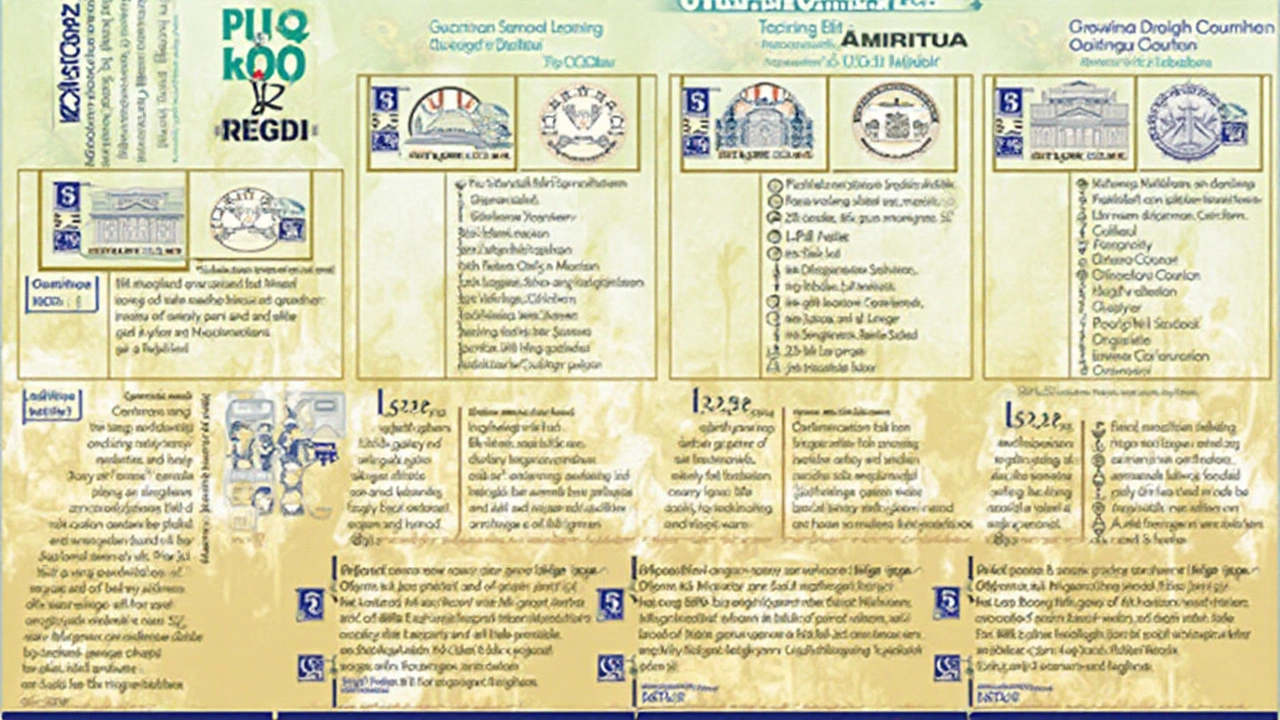In the vibrant and diverse landscape of Indian education, diploma courses offer a unique pathway for students to gain practical skills and enter the workforce quickly. Unlike conventional degrees, diplomas focus more on practical knowledge and less on theoretical instruction, making them highly sought after by both students and employers.
In India, diploma certificates can be issued by a variety of institutions ranging from government schools to private colleges and technical institutes. It's crucial for students and guardians to recognize which entities are officially authorized to award these certificates to ensure qualification validity and recognition.
Understanding the accreditation and regulatory framework that governs these institutions can guide students on a path that suits their career aspirations. It's not just about signing up for a course; it's about choosing the right institution that aligns with your professional goals.
- Types of Diploma Courses
- Government Recognized Institutions
- Private Academic Bodies
- Accreditation and Regulatory Authorities
- Tips for Choosing the Right Course
Types of Diploma Courses
Diploma courses in India present a fascinating world of opportunities, offering focused knowledge in various fields without the lengthy commitment that degree programs demand. This route caters to those eager to gain expertise in specific areas rapidly. The education landscape here is diverse, with options ranging from vocational and polytechnic programs to more advanced postgraduate diplomas. These courses fit snugly between traditional academics and on-the-job training, blending theoretical insights with practical skills that are in high demand across industries.
One prominent category is the diploma courses India offers in the engineering domain through polytechnic institutes. These courses, usually spanning three years, equip students with hands-on experience and prepare them for roles in civil, mechanical, electrical, and computer engineering fields. Graduates often find themselves in high-demand roles, bridging the gap between technology and its practical applications. Additionally, the healthcare sector boasts several specialized diplomas, such as those for pharmacy, radiology, and optometry, which focus on preparing students for front-line roles in hospitals and clinics.
A unique offering in India's educational arsenal is the diploma in education (D.Ed), critical for aspiring teachers in primary and secondary schools. This course sharpens pedagogical skills and ensures that the education system's future backbone is well prepared. The landscape doesn't stop there; 'creative arts' diplomas in animation, graphic design, and fashion design provide a platform for unleashing creativity with a professional edge. The Indian film and fashion industries have a constant demand for such skilled individuals, making these courses incredibly appealing.
Business and management aspirants have options too, with diplomas in business administration and human resources. These courses succinctly cover the essentials of business operations, strategy, and personnel management, paving the way for a substantial career launch in corporate sectors. What's intriguing is the versatility of diploma courses—they cater to both the workforce and academia, with many offering avenues for further studies upon completion. A study by the Indian Government indicated that students with diplomas often secure jobs faster than those pursuing conventional degrees, attributing this trend to the tailored, industry-specific training provided by these courses.
"Diploma courses offer a perfect balance of theory and practice, giving students the edge to thrive in real-world scenarios," noted a report from the All India Council for Technical Education (AICTE).
Intriguing disciplines like travel and tourism, event management, and hotel management have their dedicated diplomas too. As India's hospitality and tourism industry burgeons, these fields continue to evolve, always scouting for well-trained professionals. The dynamic curriculum of these programs often includes internships, giving students a taste of the fast-paced yet rewarding sector.
To summarize, the world of diploma courses in India is as diverse and rich as the nation's culture itself. It resonates with those seeking advancement or a fresh start, providing a cost-effective, time-efficient educational path. Prospective students must consider their career aspirations carefully, analyzing which domains are expanding, to select a program that aligns with their goals. This journey of focused knowledge acquisition, when aligned with one's passion, can lead to remarkable career milestones.
Government Recognized Institutions
In India, the realm of education, especially when it involves diploma courses, is largely defined by the presence of government recognized institutions. These institutions include polytechnics, state technical boards, and certain universities that have been granted the authority to confer diploma certificates in a multitude of disciplines ranging from engineering and technology to hotel management and healthcare.
An essential aspect of enrolling in diploma courses India is ensuring the institution has the necessary affiliations and approvals. A significant body in this context is the All India Council for Technical Education (AICTE), which provides accreditation to institutions offering technical education. This approval not only validates the diploma but also enhances its weight when it comes to recognition by employers. A diploma from an AICTE-approved institute can often translate into broader job prospects domestically and internationally.
Moreover, the National Board of Accreditation (NBA) also plays a crucial role in evaluating and providing accreditation to diploma courses, ensuring that the programs meet world standards. It's important to note that many state-level technical boards operate under the purview of their respective state governments, offering diplomas tailor-made to the industrial and service sector requirements unique to each state. These boards often work in conjunction with national policies to create curricula that are reflective of both regional and global technological advancements.
In a thought-provoking statement, the Ministry of Human Resource Development once emphasized that, "Quality education is only as effective as the recognition it garners post-completion, pushing us to constantly evolve our accreditation processes." Integration of such perspectives into policy frameworks reinforces the importance of aligning educational avenues with regulatory standards.
Given the complexities, students must diligently research which government-recognized body underpins the diploma course they are interested in. Resources for verifying this information can often be found on government portals dedicated to education and technical training. At times, an extensive list of AICTE-approved institutions is released, guiding students toward credible colleges and polytechnics.
To illustrate further, one can consider polytechnic institutes, which prominently feature across various states. These institutions specialize in engineering courses and work under the strict guidance of state boards. They have curated their programs to not just meet academic needs but also industry demands, creating a sovereign space for students to cultivate relevant skills swiftly.
With an ever-growing emphasis on skill development, government initiatives also promote the establishment of diploma institutions in rural and underdeveloped regions. These endeavors aim to democratize education access, allowing more students to gain practical skills without the burden of costly fee structures typically associated with urban education hubs.
Exploring government-recognized institutions for diploma courses is not only a step toward achieving one's educational goals but also an investment into a more promising future. It pays to tread carefully, considering both the nature of the diploma and the eventual recognition it receives in professional circles.

Private Academic Bodies
Private academic bodies in India have been a driving force in the educational sector, offering a range of diploma courses that cater to the evolving demands of the job market. These institutions often bridge the gap between theoretical knowledge and practical application, providing students with skills tailored for industry readiness. Unlike government institutions, private colleges and universities have a greater degree of flexibility in designing curricula, which allows them to update course offerings rapidly to meet the needs of technological advancements.
Students pursuing Indian education through private entities often benefit from smaller class sizes, enhanced teacher-to-student ratios, and state-of-the-art facilities. This setup encourages a more intimate learning experience, fostering stronger interaction between instructors and learners. As such, students receive timely feedback, personalized instruction, and direct application of concepts through lab work and workshops. An intriguing development in recent years has been the emergence of industry-linked programs that culminate in a diploma, where corporate partners contribute real-world projects as part of the course requirements.
Many of these private bodies are affiliated with or recognized by national institutions such as the All India Council for Technical Education (AICTE), ensuring a level of standardization and quality control. This affiliation is crucial because it affects graduation outcomes, employability, and, most importantly, the acceptance of the diploma certificates. It's not uncommon to see partnerships between private institutions and tech giants or major corporations, leading to placement opportunities for graduates. These synergies between education and industry underscore the credibility and value of qualifications earned in this context.
The commercial flexibility of private academic bodies also extends to the admission process, which is generally less rigid compared to public institutions. While entrance exams and merit-based allocations remain a benchmark, private colleges often implement a more holistic review process, considering extracurricular activities, personal interviews, and unique talents as part of their criteria. This approach provides students with diverse backgrounds an opportunity to excel in fields they are passionate about, even if their academic prowess may not be reflected solely in standardized test scores.
The Confederation of Indian Industry noted, "Over 50% of employers today prefer graduates from private institutions due to their industry-ready skills and practical knowledge." This suggests that the employability of graduates from private academic bodies might be higher given their immediate readiness to integrate into the workforce.
The costs associated with private education can be a consideration, as tuition fees are generally higher compared to that of government-funded schools. However, this is often offset by scholarship opportunities, financial aid, and flexible payment options that institutions offer to attract a wide array of students. Many private colleges also boast strong placement records, hosting robust career services that maintain relationships with over hundreds of recruiters across multiple sectors. Consequently, students often find that the investment pays off quickly through competitive starting salaries and significant professional advancements.
In summary, the landscape of diploma issuance in India is buoyed significantly by private educational entities. Their ability to rapidly adapt to industry needs, their partnerships with world-renowned corporations, and their commitment to providing cutting-edge facilities and resources create a compelling case for any student considering a diploma course. Prospective students are advised to thoroughly research each institution, verify their accreditations, and consider their specific goals and circumstances when choosing an educational pathway.
Accreditation and Regulatory Authorities
In India, the world of diploma courses is meticulously organized and overseen by a myriad of accreditation and regulatory bodies. These entities play a vital role in ensuring that educational institutions maintain high standards and that the diplomas they issue are recognized both nationally and internationally. Most importantly, these regulatory bodies aim to safeguard the integrity and quality of education delivered across various fields. At the forefront of this regulatory framework is the All India Council for Technical Education (AICTE), which governs technical and professional education. Established in November 1945, AICTE’s primary mission is to foster a coordinated and integrated system of technical education, ensuring sustained national development and competitiveness on a global scale.
Another significant institution in the landscape of accreditation is the National Board of Accreditation (NBA). The NBA focuses on assessing the quality of education provided by institutions offering diplomas and degrees in sectors such as technology, management, pharmacy, and hospitality. This organization relies on a rigorous evaluation process to certify programs, auditing them against international benchmarks. The importance of this cannot be underestimated, as a diploma certified by the NBA bears stature and esteem in both academic and industrial circles, providing students with a competitive edge in employment.
Moreover, one must not overlook the role played by the University Grants Commission (UGC) in the accreditation process. Rather than directly accrediting diploma courses, the UGC's influence lies in its broad regulatory mandate over university-level education, thus setting a precedent for other forms of education. Any institution offering recognized diploma courses must ensure that they comply with the guidelines and standards set by the UGC, as it is instrumental in maintaining the overall educational standard in the nation.
The UGC’s influence in shaping the education landscape in India is profound. As a respected source notes, "The UGC not only regulates the academic framework but also aids in the distribution of funds, ensuring equitable access to quality education for all."
In addition to these central bodies, states also have their technical education regulating authorities, tailoring courses and certifications to meet regional industrial needs. For students, awareness of these local bodies can make a vital difference, as each region’s industrial needs and job markets are unique. Prospective students are encouraged to investigate these state-level regulations and requirements to maximize the benefits of their chosen diploma courses in India.
In terms of statistics, India's education sector, steered by these robust accreditation processes, has seen a significant rise in enrolment figures in technical and vocational courses.
| Year | Enrolment in Diplomas (in thousands) |
|---|---|
| 2020 | 950 |
| 2023 | 1140 |

Tips for Choosing the Right Course
Choosing the right diploma courses India is a decision that should not be taken lightly. Your choice could set the stage for your professional life, and thus warrants careful consideration. First and foremost, identify your career interests and objectives. It’s important to assess what you are genuinely passionate about and what aligns with your long-term career goals. Reflect on your personal skills and talents as these can provide indicators of which fields might suit you best. For instance, those with a knack for numbers and analysis may find accounting diplomas rewarding.
Accreditation by a recognized authority is a must when selecting a diploma course. Accreditation ensures the quality and standard of education provided by the institution. Check if the institution is approved by relevant bodies such as the All India Council for Technical Education (AICTE) or the University Grants Commission (UGC). An accredited course not only confirms quality assurance but also ensures better recognition among employers, giving students an edge in the competitive job market.
It's crucial to evaluate the curriculum of the diploma program as well. A robust, comprehensive curriculum that is regularly updated will equip you with both foundational and advanced skills relevant to your chosen field. Speak to alumni and current students if possible, and delve into reviews and testimonials about the course and institution. These firsthand accounts can offer invaluable insights into the teaching methods, faculty competence, and the overall learning environment.
Consider the practical aspects like course duration, fees, and availability of study resources including laboratories, workshops, and libraries. Look into the financial investment you are about to make. Does the institute offer scholarships or financial aid? What is the return on investment in terms of job placements and salary packages? A careful examination of these factors will help you determine whether the course is economically viable.
"The foundation you lay with your educational choices can define your career for years to come," says renowned education consultant S. Mukherjee. "Choosing the right course not only prepares you professionally but also empowers you personally by boosting your confidence and competence."
The geographical location of the institution can be another determining factor. Are you comfortable relocating? Does the location offer additional learning opportunities, such as industry visits or networking events? Proximity to industry hubs might provide enhanced internship and employment opportunities, making location an important element to consider.
Finally, understanding the market demand and job prospects is essential. Research current trends and future growth areas within your field of interest; this will enable you to make an informed choice. Look for industries that have data indicating higher employment growth rates, as this signifies better job security and opportunities for advancement.





Write a comment